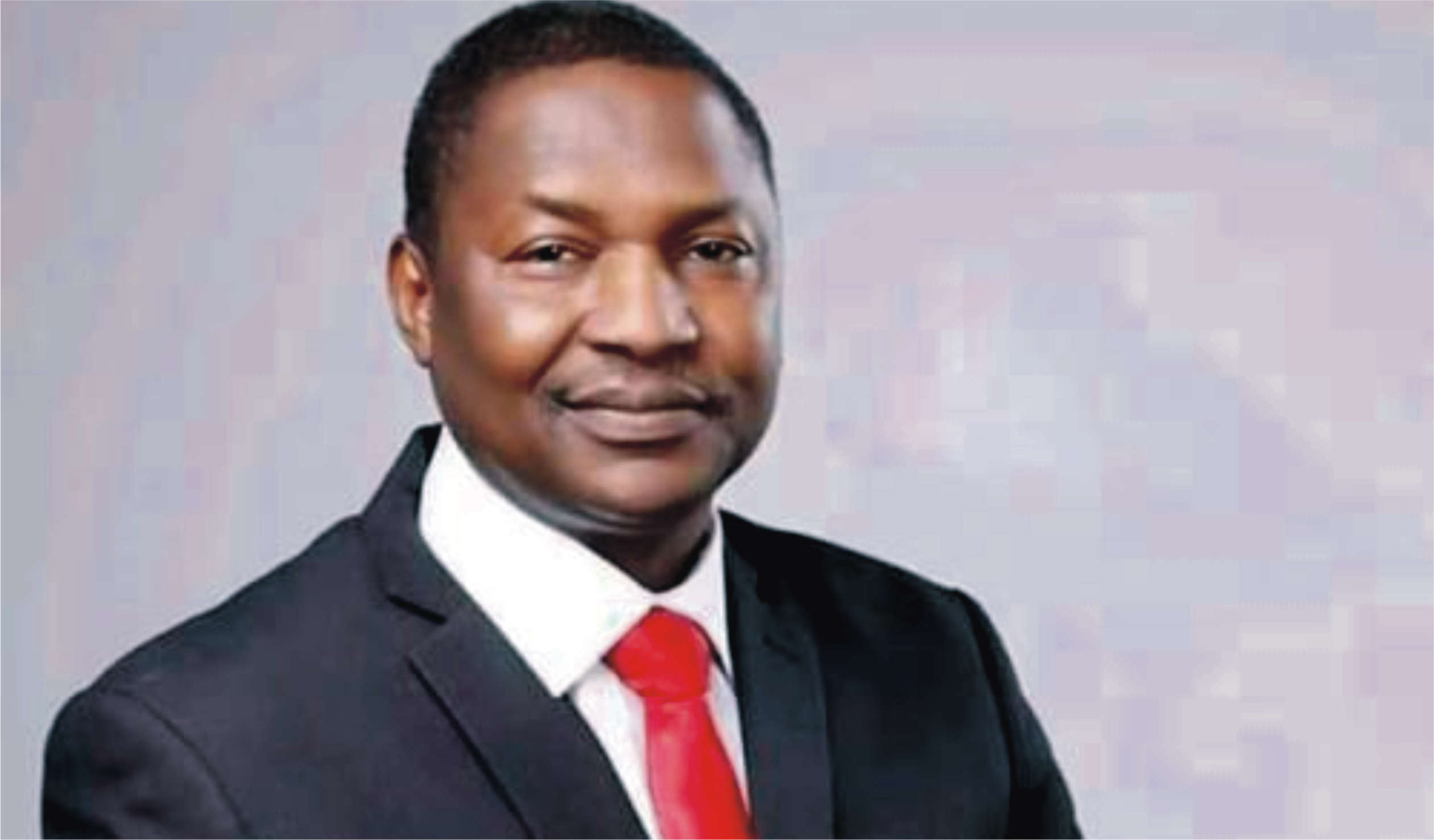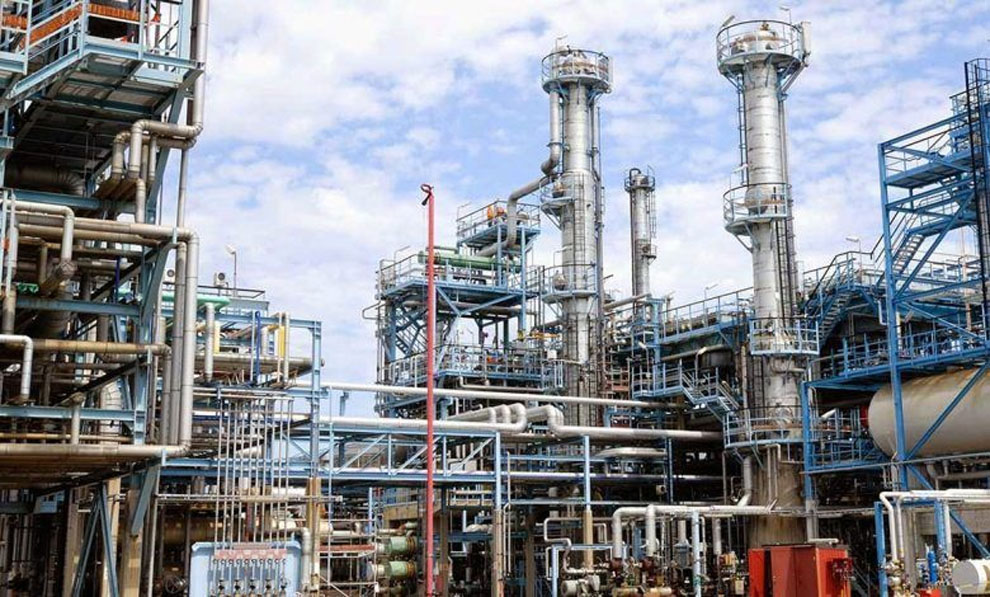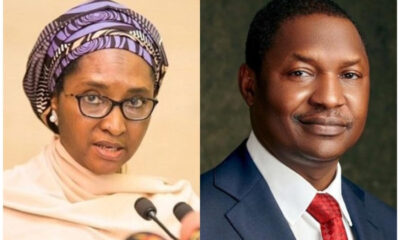Business
FG begins sale of recovered assets

The Federal Government has begun the process of selling recovered and forfeited assets in 25 locations across the country.
The sale of the items, which comprise ships, plants, machinery, electronics and furniture, is part of efforts to raise funds to meet its obligations.
They are assets either recovered or forfeited by suspects facing corruption charges.
A statement on Tuesday by the Solicitor-General of the Federation and Permanent Secretary, Ministry of Justice, Mr Dayo Apata (SAN), called on interested persons and or firms to look out for its publication and “make submissions in the required format and within the specified timelines.”
He added that the disposal of the affected assets was in line with the mandate of a committee approved by President Muhammadu Buhari to oversee the sale and the inherent prosecutorial powers of the Attorney-General of the Federation and Minister of Justice.
Apata, who doubles as chairman, Inter-Ministerial Committee on the Disposal of Assets Forfeited to the Federal Government of Nigeria promised to be transparent and accountable in the disposal of assets recovered from looters.
The Attorney-General of the Federation and Minister of Justice, Mr. Abubakar Malami (SAN), had inaugurated the inter-ministerial committee in November 2020 in compliance with the president’s directive that the committee should dispose of the forfeited assets within six months.
Malami had said that the setting up of the committee was borne out of the president’s directive in October 2018 following recommendations of the Presidential Audit Committee on Recovery and Management of Stolen Assets and a need for efficient management of the assets.
He had said, “It is aimed at ensuring proper coordination of the disposal of the federal government’s assets and for promoting a uniform, harmonised and transparent procedure to safeguard the assets recovered by the relevant agencies in line with the anti-corruption drive of this administration.
“Your mandate is to ensure the expedient disposal of all FGN forfeited assets and generate revenue for the Federal Government of Nigeria.
“Accordingly, I wish to solicit the cooperation of all members of the Inter-Ministerial Committee in that respect.”
Apata, however, assured the public that the disposal of the assets will be carried out in a very transparent manner.
He stated that the committee had already kick-started the process on February 1, 2021, with publications in the Federal Tenders Journal and two national newspapers.
Among the assets listed for disposal are landed property, plants, machinery, motor vehicles, electronics, furniture and equipment.
Others are canoes, boats, barges, ships, jewellery, ornaments and clothing materials.
To achieve transparency, Apata told journalists in Abuja that the committee “intends to engage valuers and auctioneers as part of the disposal process.”
According to him, members of the committee have completed the conflict of interest and non-disclosure forms, while the committee has also adopted a communication and media strategy to keep the public abreast of its activities.
Business
Naira exchanges N1,650/$ in parallel market

Naira exchanges N1,650/$ in parallel market
Yesterday, the Naira appreciated N1,650 per dollar in the parallel market, compared to N1,655 on Monday.
Similarly, the Naira appreciated to N1,535 per dollar in the official foreign exchange market.
Data published by the Central Bank of Nigeria, CBN, showed that the exchange rate for the Nigerian Foreign Exchange Market (NFEM) fell to N1,535 per dollar from N1,537 per dollar on Monday, indicating N2 appreciation for the naira.
READ ALSO:
- Tension as Anambra community union asks monarch to stop Ofala Festival
- Exchange rate ends 2024 at N1,535/$1, marking a 40.9% depreciation
- Lagos govt clears traders from rail tracks at Bolade, Oshodi
Consequently, the margin between the parallel market and NFEM rate narrowed to N115 per dollar from N118 per dollar on Monday.
Naira exchanges N1,650/$ in parallel market
Business
Exchange rate ends 2024 at N1,535/$1, marking a 40.9% depreciation

Exchange rate ends 2024 at N1,535/$1, marking a 40.9% depreciation
The exchange rate between the naira and the dollar ended the year at N1,535/$1 representing a 40.9% depreciation for 2024.
The official exchange rate between the naira and dollar closed in 2023 at N907.11/$1 thus depreciating by 40.9% for the year which compares to a 49.1% devaluation at the end of 2023.
READ ALSO:
- Lagos govt clears traders from rail tracks at Bolade, Oshodi
- Four countries that won’t celebrate New Year
- Social media abuzz over Fayose claim of N50m donation to VeryDarkMan’s NGO
Nigeria introduced several foreign exchange policies in 2024 as the central bank expanded on market-friendly forex policies to attract foreign investors.
Meanwhile, on the parallel market where the exchange rate is sold unofficially, the naira exchanged for N1,660 to the dollar when compared to N1,215/$ according to Nairametrics tracking records. This represents a 26.8% depreciation.
Exchange rate ends 2024 at N1,535/$1, marking a 40.9% depreciation
Business
Warri refinery: Marketers hopeful of further petrol price drop

Warri refinery: Marketers hopeful of further petrol price drop
There was excitement on Monday as the Warri Refining and Petrochemical Company (WRPC) commenced partial production.
This is coming after nearly a decade of dormancy as the 125,000 barrels per day refinery was confirmed to be working at 60 per cent capacity, according to the Nigerian National Petroleum Company Limited (NNPCL).
The refinery, inactive since 2015 due to prolonged repairs, reportedly began refining activities last Saturday at its Area 1 plant, where crude oil was successfully pumped into the system.
This was coming about a month after the commencement of operations at the 60,000-barrel-per-day-old Port Harcourt Refinery.
The NNPCL Group Chief Executive Officer, Mele Kyari, announced the resumption of operation at the Warri Refinery during a tour of the facility on Monday.
Kyari was seen in a video posted by Channels TV addressing a tour team, which included the Chief Executive Officer of the Nigerian Midstream and Downstream Petroleum Regulatory Authority, Farouk Ahmed.
READ ALSO:
- Catholic priest sentenced to 11 years for criticising his president
- Warri refinery now operational, doing 125,000bpd – NNPCL boss
- Kwankwaso says no power-sharing agreement with Atiku, Obi
Earlier, Kyari explained that the inspection aimed to show Nigerians the level of work completed so far.
He said though the repairs on the facility were not 100 per cent complete, operations had commenced.
He said, “We are taking you through our plant. This plant is running. Although it is not 100 per cent complete, we are still in the process. Many people think these things are not real. They think real things are not possible in this country. We want you to see that this is real.”
With the addition of Warri Refinery, Nigeria’s refining capacity has further increased with marketers anticipating a further reduction in price of premium motor spirit (PMS).
The 650,000-barrel Dangote Refinery has commenced production in addition to the Port Harcourt Refinery with a total capacity of 210,000 barrels per day (bpd) comprising 60,000 bpd for the old plant and 150,000 bpd for the new plant.
It’s good for business, prices may reduce – Marketers
Major Energy Marketers’ Association of Nigeria (MEMAN) and the Independent Marketers Association of Nigeria (IPMAN) welcomed the revival of the Warri refinery, saying it would deepen competition, diversify supply and ultimately resort to price reduction.
Executive Secretary of MEMAN, Clem Isong in a chat with our correspondent stated that the Warri Refinery is the shortest route to the North, describing its revival as good news.
“The market becomes more competitive and we are diversifying supply,” he said.
On whether it would lead to price reduction, he stated, “There are many factors that affect price, competition is always good and you can always get your product at the best price.”
National Public Relations Officer of IPMAN, Alhaji Olanrewaju Okanlawon in a chat with our correspondent said, “If there is excess supply, it will keep bringing down the price. We now run a free market and it is about demand and supply. It will continue bringing down the price. It will decongest Lagos.”
Energy expert, Dr. Ayodele Oni said the resumption of Warri Refinery would boost the local refining capacity in addition to enabling the country to sell to other neighbouring countries.
“We can refine more and even have some to sell. We now stop being hewers of wood and drawers of water. We add value to what we produce and can make/ do more with our base resources. This is very pleasant news,” he said.
Warri refinery: Marketers hopeful of further petrol price drop
-

 Politics3 days ago
Politics3 days agoGbajabiamila speaks on his rumoured Lagos governorship ambition
-

 metro3 days ago
metro3 days agoFarotimi to pursue disbarment over arrest, defamation allegations
-

 Business2 days ago
Business2 days agoReal reason Dangote, NNPC drop petrol price — IPMAN
-

 Health2 days ago
Health2 days agoABU Teaching Hospital will begin kidney transplant in 2025 – CMD
-

 Sports1 day ago
Sports1 day agoAnthony Joshua prostrates before Governor Abiodun during Ogun visit
-

 metro3 days ago
metro3 days agoEl-Rufai accuses Tinubu govt of Yoruba agenda, Reno Omokri reacts
-

 metro3 days ago
metro3 days agoNigerian govt urged to intervene in Mozambique post-election violence
-

 metro1 day ago
metro1 day agoN180m not missing from my account, it was all a plan – Verydarkman












You must be logged in to post a comment Login